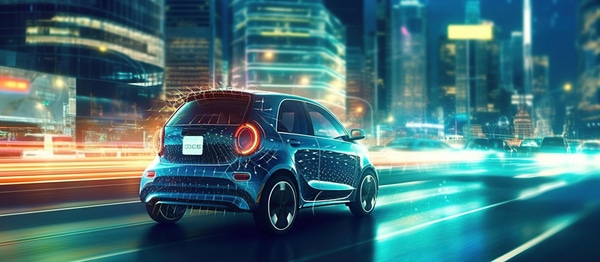“India’s Growing Electric Vehicle Landscape”
“The Evolving Ecosystem: India’s Advancements in Electric Vehicle Technology” India’s electric vehicle (EV) sector undergoes significant growth, driven by global sustainability initiatives and national carbon reduction goals. This evolution extends beyond a mere shift from traditional to electric power, embracing advanced electronics and cutting-edge technologies. Major industry players shape this transformation through substantial investments and […]

“The Evolving Ecosystem: India’s Advancements in Electric Vehicle Technology”
India’s electric vehicle (EV) sector undergoes significant growth, driven by global sustainability initiatives
and national carbon reduction goals. This evolution extends beyond a mere shift from traditional to electric power, embracing advanced electronics and cutting-edge technologies.

Major industry players shape this transformation through substantial investments and collaborations, emphasizing a shared commitment to building a robust EV ecosystem. At the forefront of technological progress are Application-Specific Integrated Circuits (ASICs), the unseen architects behind the intricate electronic systems powering EVs.
Unveiling the EV Landscape: Growth, Trends, and Government Initiatives
The Indian EV market, valued at $5.50+ billion in 2023, is projected to surge to $36-37+ billion by 2028,
boasting a remarkable compound annual growth rate (CAGR) of around 45+% (Mordor Intelligence). Commercial vehicles dominate this trajectory, indicating the expanding footprint of sustainable mobility.
The government actively promotes EV adoption through initiatives like the Faster Adoption and Manufacturing of Hybrid and Electric Vehicles (FAME) scheme, particularly FAME II, providing financial incentives for electric two-wheelers, three-wheelers, and four-wheelers.
ASICs: The Unseen Powerhouses Driving EV Efficiency
ASICs emerge as the backbone of modern EVs, orchestrating the complex interplay of electrons within these vehicles. From controlling electric motors to managing battery systems and facilitating onboard communication, semiconductors play a pivotal role in ensuring the seamless operation of EVs. VLSI chips, governing motor drive circuits and inverters, optimize power electronics components, enhancing efficiency and minimizing energy losses.
This flexibility in VLSI design leads to tailored implementations, fostering tangible improvements in power conversion and overall performance.
AI Integration: Transforming EVs into Intelligent Mobility Solutions
Embedded AI solutions usher in a transformative era in the automotive industry, enabling real-time data
processing for advanced driver assistance systems (ADAS), predictive maintenance, and adaptive energy management. This integration not only enhances the cognitive capabilities of EVs but also establishes a foundation for a more intelligent and efficient ecosystem.
Overcoming Challenges: Semiconductor Design, Charging Infrastructure, and BMS Optimization
The Indian EV ecosystem faces challenges that demand attention for sustained growth. These include designing energy-efficient semiconductors, establishing a robust and smart charging infrastructure, and optimizing Battery Management Systems (BMS) for cost efficiency and longevity.
Opportunities for Growth: MosChip’s Perspective
From MosChip’s standpoint, opportunities for growth in India’s EV ecosystem include Real-Time Operating Systems (RTOS) integration for enhanced responsiveness, FPGA development for automotive electronics optimization, custom ICs and power electronics development, sensor fusion technology for advanced perception, and cybersecurity implementations to address evolving threats.
Future Outlook: Shaping a Sustainable and Competitive EV Ecosystem
The future of India’s EV industry appears promising, with advancements in semiconductor technologies like wide-bandgap semiconductors poised to revolutionize efficiency and reduce energy losses.
Government commitments to green mobility, coupled with advancements in automotive electronics, set the stage for a sustainable and competitive EV ecosystem. Increased collaboration, improved charging infrastructure, and continued technological advancements will likely accelerate EV adoption, shaping a future where efficiency, safety, and overall success dominate Indian roads.
In this landscape of advancing technology, MosChip remains dedicated to delivering world-class embedded solutions for automotive applications, steering the future of automotive electronics towards precision and efficiency.


